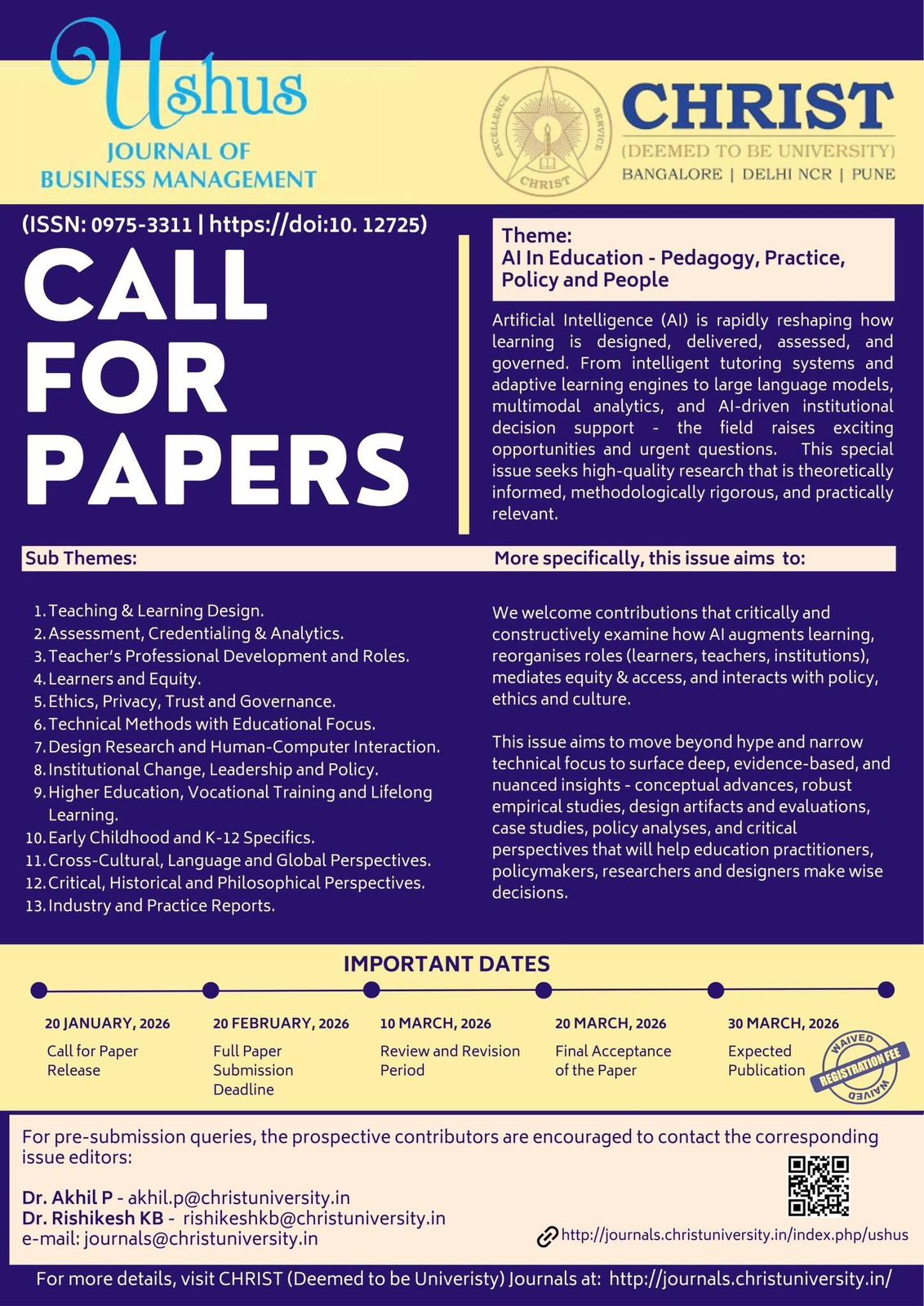Case Study: Challenges in the Uptake of Data Technologies in Large Public Sector Water Infrastructure Entities
DOI:
https://doi.org/10.12725/ujbm.68.3References
. Abraham, R., Schneider, J., & vom Brocke, J. (2019). Data governance: A conceptual framework, structured review, and research agenda. International Journal of Information Management, 49, 424-438.
. Alavi, M., & Leidner, D. E. (2001). Review: Knowledge management and knowledge management systems: Conceptual foundations and research issues. MIS Quarterly, 25(1), 107-136.
. Al-Ruithe, M., Benkhelifa, E., & Hameed, K. (2019). A systematic literature review of data governance and cloud data governance. Personal and Ubiquitous Computing, 23(5), 839-859.
. Anthopoulos, L. (2017). Understanding smart cities: A tool for smart government or an industrial trick? Springer.
. Arnstein, S. R. (1969). A ladder of citizen participation. Journal of the American Institute of Planners, 35(4), 216-224.
. Bannister, F., & Connolly, R. (2014). ICT, public values and transformative government: A framework and programme for research. Government Information Quarterly, 31(1), 119-128.
. Bovaird, T. (2007). Beyond engagement and participation: User and community co-production of public services. Public Administration Review, 67(5), 846-860.
. Bryson, J. M. (2018). Strategic planning for public and nonprofit organizations: A guide to strengthening and sustaining organizational achievement. John Wiley & Sons.
. Brusca, I., & Montesinos, V. (2006). Are citizens significant users of government financial information? Public Money & Management, 26(4), 205-209.
. Conklin, T. A. (2020). Training for the public sector: Challenges and strategies. Public Management Review, 22(6), 812-831
. Caragliu, A., Del Bo, C., & Nijkamp, P. (2011). Smart cities in Europe. Journal of Urban Technology, 18(2), 65-82.
. Carstens, D. S. (2020). Overcoming budgetary constraints in local government: An analysis of how the city of Johannesburg can successfully implement technology strategies. African Journal of Public Affairs, 11(2), 24-45.
. da Silva, M. M., Souza, J. M., Machado, R. D., & Lima, S. M. (2019). The compliance of Brazilian companies with
GDPR. Business Process Management Journal, 25(5), 1242-1264.
. Fountain, J. E. (2001). Building the virtual state: Information technology and institutional change. Brookings Institution Press.
. Freeman, R. E. (2010). Strategic management: A stakeholder approach. Cambridge University Press.
. Fung, A. (2006). Varieties of participation in complex governance. Public Administration Review, 66(s1), 66-75.
. Hedman, J., & Gimpel, G. (2010). The adoption of information systems in public sector organizations: The
case of the Danish home care sector. European Journal of Information Systems, 19(5), 595-609.
. Henfridsson, O., & Bygstad, B. (2013). The generative mechanisms of digital infrastructure evolution. MIS
Quarterly, 37(3), 907-931.
. Huang, Z., Zmud, R. W., & Price, R. L. (2010). Influencing the effectiveness of IT governance practices
through steering committees and communication policies. European Journal of Information Systems, 19(3), 288-302.
. Janssen, M. (2015). The challenges and limits of big data algorithms in technocratic governance. Government
Information Quarterly, 32(3), 363-368.
. Janssen, M., Charalabidis, Y., & Zuiderwijk, A. (2012). Benefits, adoption barriers and myths of open data and
open government. Information Systems Management, 29(4), 258-268.
. Khatri, V., & Brown, C. V. (2010). Designing data governance. Communications of the ACM, 53(1), 148-152.
. Kim, H. W., Trimi, S., & Chung, J. (2014). Big-data applications in the government sector. Communications of the ACM, 57(3), 78-85.
. Markus, M. L. (2000). Paradigm shifts—E-business and business/systems integration. Communications of the
AIS, 4(10), 1-45.
. McGee, R. W., & Moore, C. L. (2014). The ethical issues surrounding the acceptance of technology by government agencies. Public Management Review, 16(4), 523-538.
. Mergel, I., Edelmann, N., & Haug, N. (2019). Defining digital transformation: Results from expert interviews.
Government Information Quarterly, 36(4), 101385.
. Margetts, H., & Dunleavy, P. (2013). The second wave of digital-era governance: A quasi-paradigm for
government on the web. Philosophical Transactions of the Royal Society A: Mathematical, Physical and Engineering Sciences, 371(1987), 20120382.
. Morris, M. G., & Venkatesh, V. (2010). Job characteristics and job satisfaction: Understanding the role of
enterprise resource planning system implementation. MIS Quarterly, 34(1), 143-161.
. OECD. (2017). Skills for a high performing civil service. OECD Publishing.
. Otto, B. (2011). A morphology of the organisation of data governance. ECIS 2011 Proceedings.
. Pitt, C. J., Nogueira, V. P., & Cornwell, P. (2020). Strategies for overcoming funding challenges in public
sector projects. Public Sector Economics, 44(2), 103-125.
. Quick, K. S., & Feldman, M. S. (2011). Distinguishing participation and inclusion. Journal of Planning
Education and Research, 31(3), 272-290.
. Reed, M. S. (2008). Stakeholder participation for environmental management: A literature review.
Biological Conservation, 141(10), 2417-2431.
. Rowe, G., & Frewer, L. J. (2000). Public participation methods: A framework for evaluation. Science,
Technology, & Human Values, 25(1), 3-29.
. Scholl, H. J., & Scholl, M. C. (2014). Smart governance: A roadmap for research and practice. In H. J. Scholl et al.
(Eds.), Electronic government (pp. 1-12). Springer.
. Venkatesh, V., Thong, J. Y. L., & Xu, X. (2012). Consumer acceptance and use of information technology: Extending the unified theory of acceptance and use of technology. MIS Quarterly, 36(1), 157-178.
. Wang, R. Y., & Strong, D. M. (1996). Beyond accuracy: What data quality means to data consumers. Journal of
Management Information Systems, 12(4), 5-33.
. Westerman, G., Bonnet, D., & McAfee, A. (2014). Leading digital: Turning technology into business transformation. Harvard Business Review Press.
. Yigitcanlar, T., Corchado, J. M., Mehmood, R., Li, R. Y. M., & Mossberger, K. (2019). Smart cities of the future:
Creating tomorrow's sustainable cities. Future Internet, 11(10), 237.
Downloads
Published
How to Cite
Issue
Section
License
Copyright (c) 2024 Sreedath Ikarath

This work is licensed under a Creative Commons Attribution-NonCommercial-NoDerivatives 4.0 International License.



